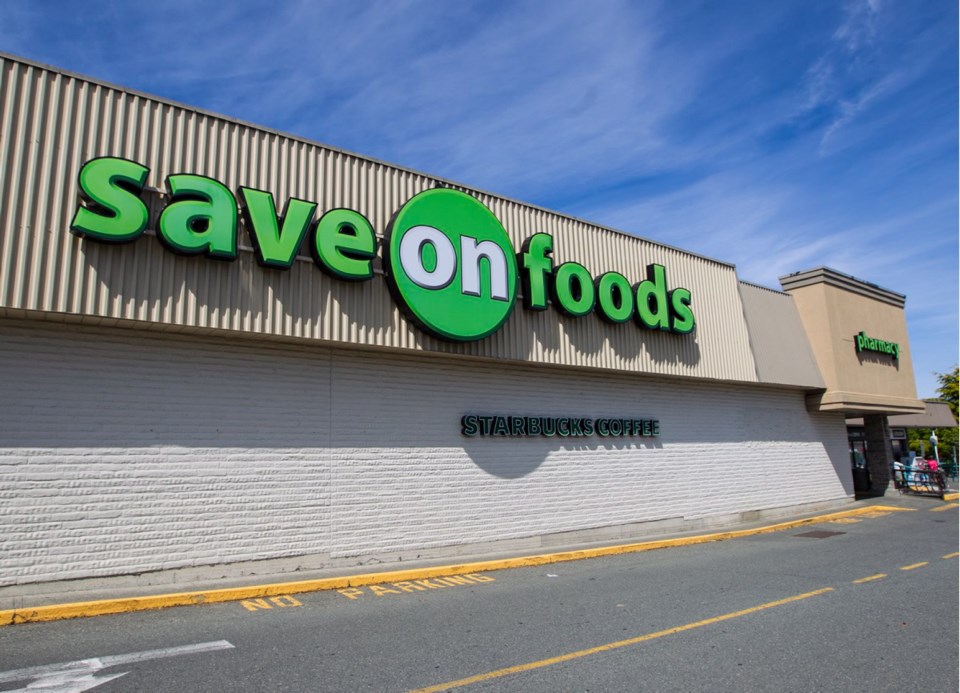Essential service workers in the grocery sector receiving extra pay during the pandemic will be watching their paycheques in the coming weeks as companies re-evaluate how they compensate employees.
Save-on-Foods, a division of the Jim Pattison Group, says it will eliminate the extra $2 per hour it has been paying workers this Saturday and will instead offer 10 per cent off their grocery bills and extra reward points.
The grocer has been sharply criticized by the union representing Save-on staff.
Kim Novak, president of United Food and Commercial Workers Local 1518, said it’s “way too soon” to take away the hazard pay.
“It is reinforced by the fact the premier has just extended the state of emergency in the province,” Novak said in an interview. “It’s truly shocking they would end this now.”
Save-on-Foods maintains the discount and triple More Rewards points exceed the current bonus, but Novak says it doesn’t compare in the middle of a health crisis.
“If a Save-on employee spends $100 on groceries a week, they get a $10 value versus $80 a week in pandemic pay.”
The provincial government is mandating a rise in minimum wage on Monday by 75 cents to $14.80 an hour. That move has already been panned by business groups, who say the increase, scheduled prior to the pandemic, should be postponed.
Novak said unionized workers at Save-on automatically make 10 cents more per hour than minimum wage when they are first hired by the grocer.
Meanwhile, Quality Foods, which was one of the first to introduce the $2-an-hour hazard pay for workers at its 13 Island stores, plans to keep it in place at least until the end of the year.
“We don’t think COVID is going away any time soon and we value our staff,” Quality Foods co-founder Noel Hayward said in an interview Thursday. “They face a risk and we want to take care of our people and look after our customers. We think it creates loyalty from both staff and customers.”
Hayward said Quality Foods was early in introducing the $2 hazard pay, following the lead of Whole Foods in the U.S. It extended the practice on May 1 until the end of the year, but has also put a pause on any other scheduled pay raises.
Dan Bregg, president of Buy Low Foods, whose 23 stores include ones in Nanaimo and Port Alberni, confirmed all staff are now getting a permanent $2-an-hour raise. Buy Low is a division of the Jim Pattison Group.
Employees at Thrifty Foods, part of the Sobeys grocery chain, have been reportedly receiving extra pay, but calls to the company for details were not returned Thursday. Thrifty Foods workers are not unionized.
Employees at Sobeys’ corporate-owned stores — about half of the stores it operates — as well as its 31 distribution centres are receiving an extra $50 per week, regardless of the number of hours they work, and a $2 per hour top up after 20 hours.
Most of Sobeys’ franchised stores are also providing those incentives.
Novak said union workers at Sobeys’ Safeway stores will get their extra pay to mid-June and then the company will reassess.
She wants to see an extension to premium pay for as long as the pandemic persists.
A campaign initiated by the union and directed at Save-on-Foods to continue hazard pay has so far generated more than 4,000 letters, said Novak.
Canadian Tire has been paying its employees an extra $2 per hour and has not determined an end date for the incentive.
Loblaw Companies Ltd., which owns Shoppers Drug Mart and Superstore among other brands, was the first national grocer to increase wages. It gave employees an extra 15 per cent, or about $2 per hour for most staff, retroactive to March 8, and has extended the increase every two weeks since. It has now extended the extra pay to June 13.
Dollarama staff have been getting a 10 per cent pay increase since March. The Montreal-based company says the increase will remain through to July 1.



